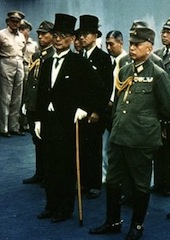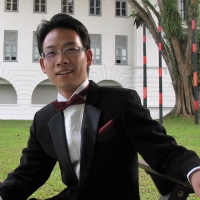China-Japan Relations: Haunted by History, Loss of Face
Japan should apologize, but then China must move on.
January 15, 2014

Ancestral veneration (or ancestor worship) originated from the Confucian philosophy as a form of filial piety. It has a long tradition in both China and Japan.
In this tradition, on December 26, 2013, the 120th anniversary of China’s founding Chairman Mao Zedong’s birth, top Chinese leaders paid a visit to Mao’s mausoleum.
While the right to such practices should be respected, they can also be politically manipulated. On the same day, Japanese Prime Minister Shinzo Abe too coincidentally visited the controversial Yasukuni Shrine. The site is a symbol of Japan’s dark imperial war history, even honoring 14 convicted Class-A war criminals from the Second World War there.
While the former visit was cheered within China, the latter one provoked strong objections and criticism — both in Japan and abroad. Postwar Chinese-Japanese relations have hit a historically low point, with the ongoing dispute over the Diaoyu Islands (known as the Senkaku Islands in Japan).
Stuck in history
The geographical neighborhood between China and Japan has always tied together the history of the two nations. As early as the Sui Dynasty (581-618 AD) and Tang Dynasty (618-907 AD), Japan had already sent several envoys to study in China.
The prosperities of maritime trade between the two nations lasted till 1633 when the Tokugawa Shogunate adopted a policy of isolationism in Japan.
However, despite once being very close, conflicts — and their legacies — have driven the two nations apart. The most daunting and unforgettable memories, especially for China, are still tied to the two Sino-Japanese Wars of the modern age.
The first was the Sino-Japanese War of 1894, in which China was defeated and forced to pay a huge indemnity and relinquish Taiwan. The war also sowed the seeds of the future Diaoyu/Senkaku Islands disputes.
The second was the Sino-Japanese War of 1937-1945 that merged into World War II. China eventually won that conflict with the help from the Allied Powers, but paid a high price of 35 million casualties and property losses amounting to $383 billion.
Struggling to save face
In Chinese people’s mind, the two violent invasions of the vast mainland by the relatively small island country Japan are the Chinese nation’s humiliation and cause for hatred, which should never be forgotten. But on Japanese side, its government has never officially acknowledged nor apologized for its military aggression history, especially to China.
Therefore, China’s loss of face has not been sincerely and satisfactorily compensated by Japan. Even worse, Japanese leaders’ frequent visits to the Yasukuni Shrine have been viewed as severe provocation in China.
Japanese probably view apologies as a kind of shame. In reality, they would do well to study the “Warschauer Kniefall” by former West German Chancellor Willy Brandt towards the victims of the Warsaw Ghetto Uprising. This action made West Germany more respectful and in turn, more respected again by its neighbors.
As a former opponent of the Nazis himself, Brandt could have argued he had no need to apologize, but as a German leader he did so on behalf of his people, for their collective guilt. In contrast, as explained in The Globalist previously, Japanese leaders today not only owe a national apology but also are themselves the scions of powerful wartime families.
Moreover, beyond the perceived shame, Japan has been uncomfortable being replaced by China as the world’s second-largest economy. It always tries to make some noises to show its non-submission. China, of course, will never give in to lose face again.
Therefore, it is no surprise that China is becoming tougher over the Diaoyu Islands disputes by aggressively announcing the East China Sea Air Defense Identification Zone.
A need to move forward
This year, as the West observes the centennial of the start of World War I, China will be marking the 120th anniversary of the first Sino-Japanese War. History is a mirror, but reviewing history should not be for recalling hatred, but for finding a better future.
For Japan, only objective and full recognition of its militarist history can ensure its long-term development and regional security in the future.
For China, it can choose either to follow the proverb “blood will have blood” or to take the Confucian advice to “recompense injury with justice.” But it is wise to keep in mind another proverb: that “vengeance has a way of rebounding upon oneself.”
In 1998, China and Japan agreed to build a “friendly and cooperative partnership for peace and development” toward the 21st Century. Despite the latest diplomatic flare-up, that should be the visionary guide leading the two nations out of their long haunted history.
Takeaways
The most daunting and unforgettable memories for China are still tied to the two modern Sino-Japanese Wars.
China’s loss of face has not been sincerely or satisfactorily compensated by Japan, which continues to provoke China.
Postwar China-Japan relations have hit a historically low point, with the ongoing dispute over the Diaoyu Islands.
The close geographical neighborhood of China and Japan has always tied together the history of the two nations.
To China, the invasions of the mainland by the comparatively small Japanese islands are their nation’s humiliation.
Read previous

India’s Water Crisis
January 14, 2014
